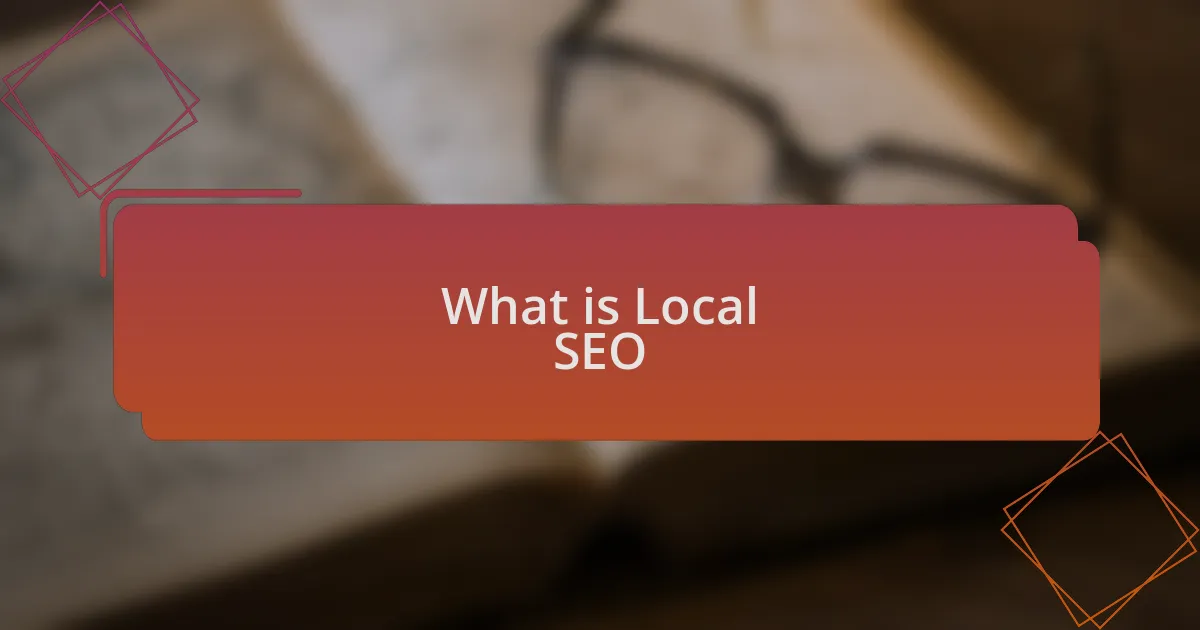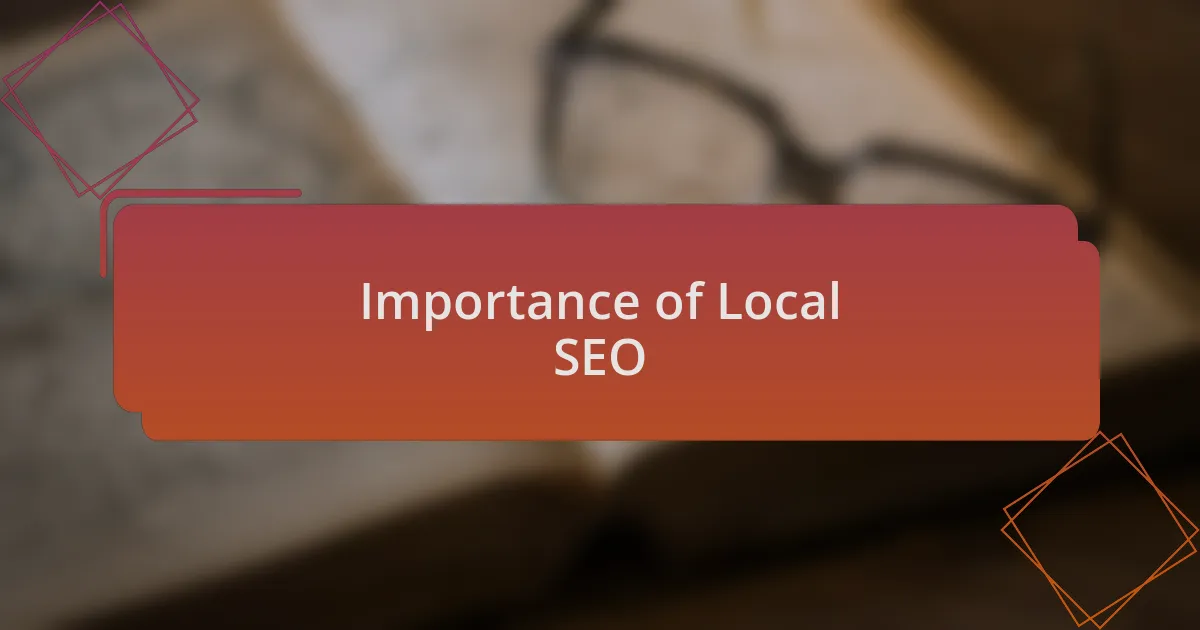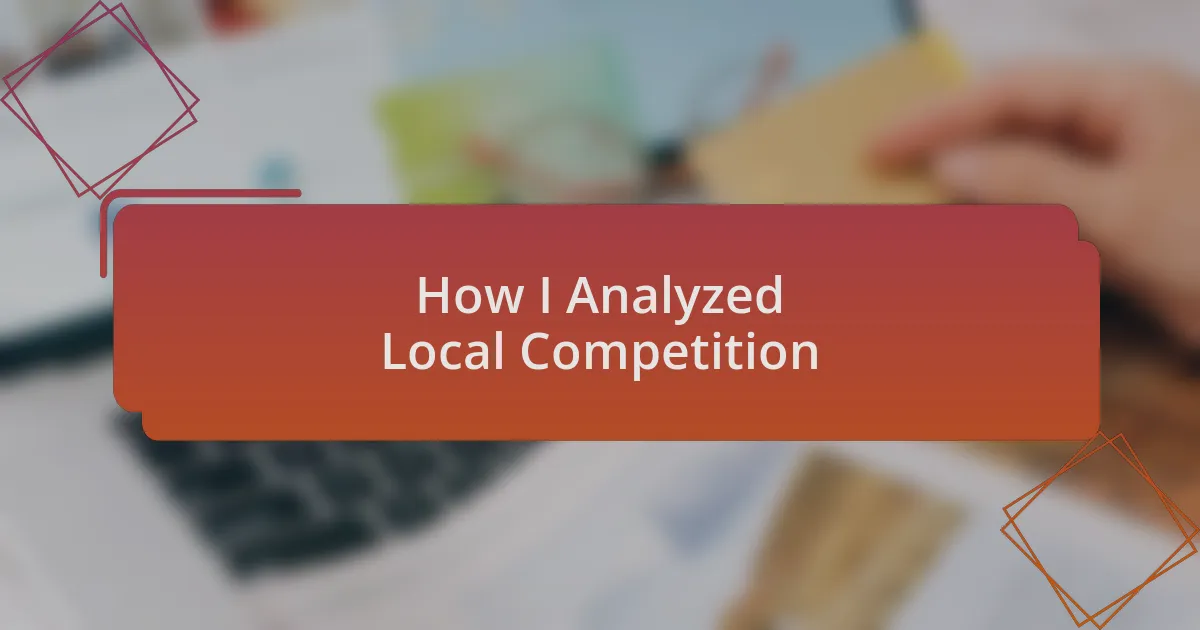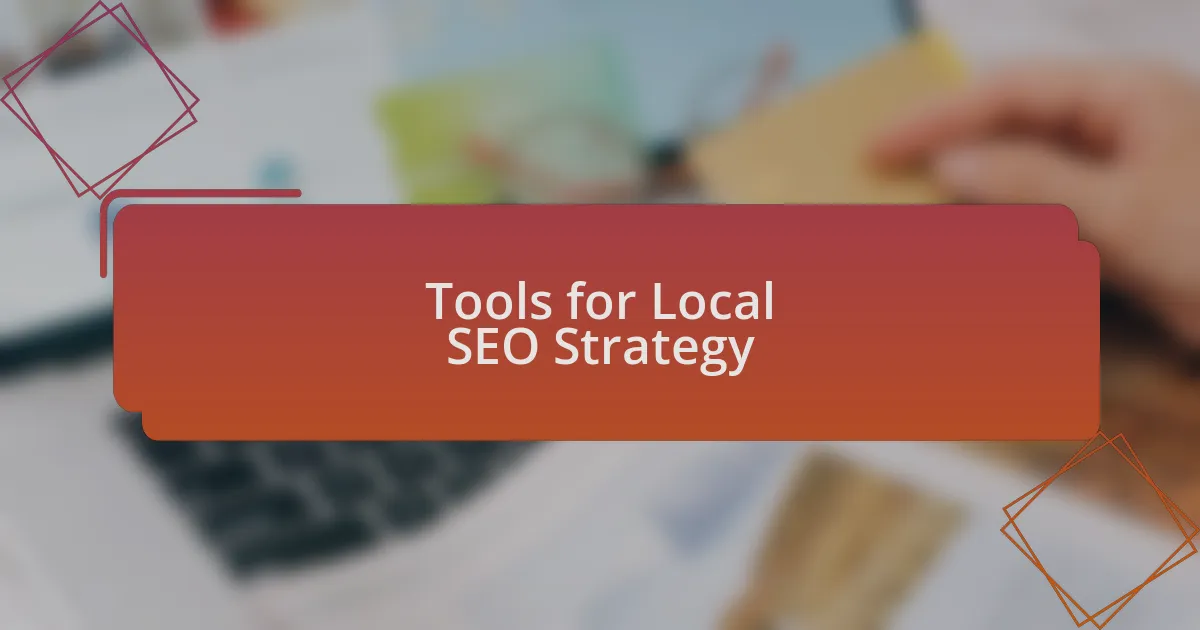Key takeaways:
- Local SEO optimizes online presence for specific geographical areas, targeting customers ready to engage locally.
- Key components include managing Google My Business listings, utilizing local keywords, and encouraging online reviews to enhance visibility.
- Analyzing local competition through tools like Moz and SEMrush helps identify opportunities to stand out.
- Setting personal SEO goals focuses on improving local search rankings and fostering genuine relationships with customers.

What is Local SEO
Local SEO is a subset of search engine optimization that focuses on optimizing a website to be found in local search results. It’s not just about attracting traffic; it’s about attracting the right traffic—customers who are close by and ready to engage with your business. I remember when I first realized the power of local SEO; a simple update to my Google My Business listing led to a noticeable increase in foot traffic to my shop.
This strategy specifically targets users looking for services or products within a specific geographical area. For instance, when someone searches for “pizza near me,” they expect results that are relevant to their location. I often ask myself, how can I stand out among local competitors? The answer lies in effectively utilizing local keywords, managing online reviews, and ensuring accurate business information online.
With local SEO, the goal isn’t just to rank high but to appear in the local pack—the three businesses that Google showcases on top of search results. I’ve seen businesses thrive from this visibility, and it just makes sense; customers are looking for convenience. Can you imagine being the first option a local customer sees? That’s the magic of local SEO—it’s about connection and community.

Importance of Local SEO
When discussing the importance of local SEO, one cannot overlook its role in fostering genuine connections with the community. For instance, I once noticed that after optimizing my website for local searches, my customer interactions became more meaningful. It wasn’t just about sales; it was about establishing relationships with nearby residents who were eager to support local businesses. Isn’t it rewarding to see your neighborhood rally around you?
Moreover, local SEO significantly boosts visibility where it matters most—right in your community. I recall a time when my shop appeared in the local pack for searches related to my services; I could hardly believe the influx of customers who commented on how they’d never seen me before, even after living in the area for years. This visibility can turn casual browsers into dedicated patrons, and in this digital age, being the go-to option in your locality can really set you apart.
Finally, harnessing local SEO drives not only website traffic but also foot traffic. I’ve experienced firsthand how a local promotion through targeted SEO increased visitors who wouldn’t have discovered me otherwise. When people can find businesses like mine with ease, it cultivates a sense of community. Isn’t that what we all want—to be a recognized part of the fabric of our neighborhoods?

Key Components of Local SEO
Key components of local SEO hinge on optimizing your online presence for your specific geographical area. One essential aspect is ensuring your Google My Business (GMB) listing is fully optimized. After updating my GMB profile with accurate information, including hours and photos, I saw a notable uptick in customer inquiries. It’s incredible how something as simple as a well-crafted GMB profile can put you on the radar of local shoppers.
Another crucial factor is local keywords. I remember when I shifted my focus to incorporate terms like “best pizza in [my town]” into my content strategy. This adjustment not only made my website more relevant to those searching for nearby options but also helped establish a stronger connection with my community. Have you tried using specific local terms in your content? It can create a more relatable vibe for your target audience.
Furthermore, online reviews play an impactful role in local SEO. I once received a heartfelt review from a customer who shared how my services made a personal difference in their life. This not only fueled my passion but also encouraged others to choose my business based on that genuine experience. Do you realize how much potential a single review holds? It can sway new clients toward your door just by sharing authentic customer stories.

How I Analyzed Local Competition
To analyze local competition effectively, I dove deep into their online presence. I began by conducting a competitor analysis using tools like Moz and SEMrush, which allowed me to identify their keyword strategies and backlink profiles. It was fascinating to see what local businesses in my niche were doing right and where they were missing the mark.
I distinctly recall visiting competitors’ websites and taking notes on their content and layout. This exercise revealed gaps in their SEO strategy, particularly in local keyword usage that I could exploit. I realized that while many had strong social media followings, they lacked engagement with their audience—a perfect opportunity for me to connect on a more personal level.
Next, I made it a point to inspect their Google My Business listings. I was surprised to discover that several competitors had incomplete profiles, which made my heart race with excitement. I thought about how even small details like these could be my advantage. I considered, what if my profile stood out in ways theirs didn’t? This determination fueled my approach, helping me craft my SEO strategy to target those local customers effectively.

Tools for Local SEO Strategy
When it comes to local SEO, I’ve found that tools like Google Keyword Planner and Ahrefs are invaluable. These platforms help me discover local keywords that potential customers are using. I remember the thrill of uncovering a long-tail keyword that had low competition but high search volume—it felt like striking gold!
Another essential tool I frequently turn to is BrightLocal. This tool not only helps me track my local rankings but also provides insights on my competitors’ local SEO efforts. Seeing my positioning in real-time against theirs sparked a competitive fire in me. It made me ponder: how can I leverage my unique value propositions to surpass them in local search results?
Lastly, I can’t stress enough the importance of customer review management tools like Podium or Trustpilot. Encourage your customers to leave positive reviews, and you’ll likely see a boost in local ranking. I vividly remember how a handful of glowing testimonials transformed my online credibility. It made me think: what stories do my satisfied customers have to share? Their voices can significantly impact my local SEO strategy, turning satisfied clients into my best marketing allies.

My Personal SEO Goals
When I define my personal SEO goals, I focus on achieving a higher local search ranking because it directly impacts my visibility. One of my primary objectives is to secure a spot in the coveted local 3-pack on Google. I still remember the excitement of seeing my business appear there for the first time; it felt like being invited to the VIP section of the online world. How can I ensure that my business becomes the go-to option for local customers?
I also aim to enhance my website’s user experience to keep visitors engaged longer. I recall a time when I revamped my site layout—simplifying navigation and improving load times. The changes not only reduced my bounce rate but also sparked more inquiries from potential clients. Isn’t it fascinating how small tweaks can lead to significant results?
Another key goal is to foster genuine relationships with my local customers. Personal interactions have a way of translating into loyalty. I try to actively participate in community events and engage with my audience on social media, which has made me realize that people appreciate a brand that feels human. How can I continue to grow those connections and ultimately turn them into word-of-mouth referrals?